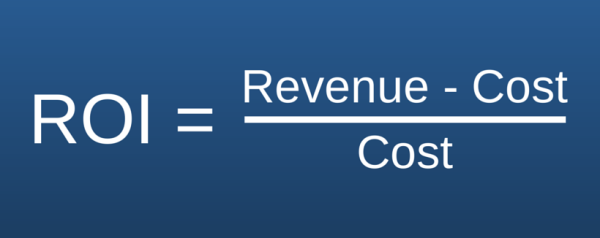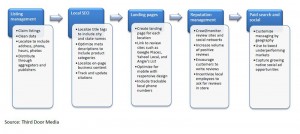By Caroline Moore, Published November 13, 2014

Sometimes when evaluating your marketing campaign, you just need a quick way to tell if your ads are leading to and directly impacting the success of your business.
The answer to this puzzle? A really cool KPI called ROI. Yeah, the marketing industry really likes acronyms.
But this post isn’t going to be about silly English terms. It’s going to be about math, and how one simple equation can show you if your PPC campaign is a success.
What Is It?
ROI means “return on investment,” a way to assess the efficiency of an investment. For our purposes, it’s a way to measure the profitability of your ads. You want to know if they’re benefiting your business? This is how you find out.
The Equation
So, I hate math. Really I do. But the thing that’s so great about ROI is its simplicity. It’s quick. It’s easy. And it works.
ROI = (revenue from investment – cost of investment)/ cost of investment
ROI is presented as a percent.
So let’s do an example.
You brought in $ 200 from your recent ad campaign. The campaign cost $ 100 and it took $ 50 to make the products sold ($ 150 total cost). Now just plug it in:
(200 – 150)/150 = 33.3% ROI
ROI’s Popularity And Versatility
With ROI, it’s easy to tell if your ads are getting the results you want. In other words, you can easily find out if your return on investment is high enough for your company’s liking.
If your ROI is negative, it’s usually a good sign that your campaign needs work.
You can also use ROI to compare two or more ads to see which is bringing in more bang for your buck. If one has a higher ROI than others, you may want to consider changing the lower ads to mirror the one that’s working, or experimenting with other optimization methods.
Your ROI calculation can be altered or tweaked to fit whatever situation you want to measure the profitability of. It all depends on what you deem the two variables to be. What are the returns? What are the costs? It’s for you to decide within your use of the equation.
For example, three different ROI calculations could define returns as ‘revenue from ads,’ but define costs as ‘cost of ads,’ ‘costs of making products sold,’ or a combination of the two. There is no one right way to do it.
With such flexibility, ROI rocks as a simple, quick, and functional tool to pull out of your KPI tool box.
Complications
ROI does a great job of telling you what the profitability of an investment is, but not why it’s at that level. This requires you to do a little more work to figure out the ‘why’ yourself.
You still need to analyze the data. That number tells you what your ROI is, but not why it’s that specific percentage, or how to improve it. If your ROI skyrockets one day, you definitely want that to happen again. But first you have to figure out what made it jump so much so you can try to repeat it.
Limitations
The simplicity of ROI does lead to a few weakness.
When calculating ROI for a future investment, you’re just making predictions.
Let’s say you’re planning an ad campaign. You predict that it will cost $ 1,000 and bring in $ 2,500, giving you a 150% ROI. That sounds good, so you launch the campaign. But then the campaign only ends up bringing in $ 1,100. Or maybe it ends up costing a lot more than you’d thought it would.
ROI also only measures financial profitability. It doesn’t factor in other benefits, such as brand exposure.
So remember, when testing your PPC campaign, it’s still a good idea to check other KPIs such as ad impressions and click-through rate (CTR).
Pay Attention To Conversions
When using ROI as a KPI for PPC (again, with the acronyms), you’ll need to be able to see what revenue is coming from your ads.
A way to do this is by tracking conversions. These actions can be anything from buying something to filling out a form on a landing page. You can use Google Analytics goals or another tool to track conversions.
Quick Answers
Want to know if you’re profiting from an investment? ROI will show you if you’re getting more out than you’re putting in, and vice versa.
For any investment, it’s a good idea to calculate your ROI to see if your company will benefit from it.
Trust me, I rarely speak highly of math, but ROI has won my heart with its shining clarity and oh so sweet simplicity.
Social Articles | Business 2 Community
(470)
Report Post







